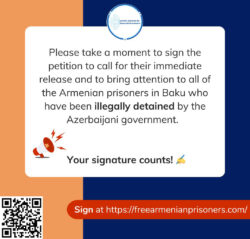Members of Congress Commemorate Azerbaijan’s anti-Armenian Pogroms

Members of Congress commemorated the 34th anniversary of the anti-Armenian Sumgait and Baku pogroms, calling on the Azerbaijani government to end its ongoing aggression against Armenia and Artsakh and urging Azerbaijan’s immediate release of all Armenian POWs illegally held after the 2020 Artsakh war.
Chicago-area Representative Raja Krishnamoorthi (D-IL) explained, “On this 34th anniversary of the Sumgait pogroms, I want to emphasize the importance of remembering these crimes against humanity. I call on the Azerbaijani government to acknowledge that these atrocities occurred and that it seeks justice for the victims by prosecuting those who committed these horrific acts of violence. I also call upon the government of Azerbaijan to take all appropriate action to prevent further tragedies of this nature, and to respect the rights of all minorities living within its borders. I condemn Azerbaijan’s ongoing aggression against Armenia, and call on the Azerbaijani government to immediately and unconditionally release all Armenian POWs and captive civilians.”
Congressional Armenian Caucus co-Chair Frank Pallone (D-NJ) concurred, noting, “Tragically, the Azerbaijani government’s approach toward Armenians has changed little since the Sumgait and Baku pogroms. We saw similar rhetoric right before Azerbaijan’s attacks on Artsakh last fall. Azeri forces, Turkish drones, and Turkish-backed mercenaries conducted an indiscriminate bombing campaign against large population centers that killed thousands of Armenians and displaced tens of thousands more civilians. It also included appalling war crimes against Armenians at the hands of Azerbaijani forces and foreign mercenaries that included beheadings, torture, and other abhorrent acts of violence. I continue to stand with the Armenian people in condemning the horrific pogroms and in mourning the loss of those who were senselessly killed in Artsakh and subsequent Azeri attacks on Armenian soil. It is critical for the United States to recognize and denounce violent assaults against all civilians. If we do not condemn or punish crimes against humanity and ethnic violence, we become passive bystanders, failing to live up to the lessons of the 20th century and our pledge to uphold human rights and democratic values all over the world. If we do not take a firm stand against those who commit atrocities, it will embolden them and encourage others to commit heinous acts in the future. These lessons are especially important as we prepare to commemorate the 107th Anniversary of the Armenian Genocide in April.”
US House Intelligence Committee Chair Adam Schiff (D-CA) explained, “Beginning on February 27, 1988, and for three days following, Azerbaijani mobs assaulted and killed Armenians – leaving hundreds of civilians dead and injured and women and girls were raped. Some victims were thrown from windows and burned alive. Tens of thousands were forced to flee. After two years, it was estimated that only 40,000 of the 250,000 Armenian residents of Baku remained in Azerbaijan. On January 13, 1990, organized Azerbaijani mobs turned on them, too, killing hundreds and injuring many more.”
“The pogroms came as a direct result of years of vicious, racist anti-Armenian propaganda by Azerbaijani authorities, dehumanizing the Armenian residents of Azerbaijan and laying the groundwork for mass violence. Azerbaijani authorities made little effort to punish those responsible, instead attempting to cover up the atrocities and deny the government’s role in instigating the attacks.” continued Congressmember Schiff. “These are the horrific consequences when aggression and hatred grow unchecked–and it is why, whether these crimes against humanity occurred one year, thirty years, or a hundred years ago, we can never allow them to go unrecognized. More than that, it is why the United States must fully step into its role as a defender of democracy and peace around the world. We must not relent in our calls for the safe and unconditional release of the remaining Armenian prisoners of war and captured civilians, for the end of US assistance to the Aliyev regime, and for stronger efforts to support democracy in Armenia and a free, independent Artsakh.”
Member of the House Foreign Affairs Committee and the Congressional Armenian Caucus for 25 years, Congressmember Brad Sherman (D-CA) conveyed the following in statement: “This tragic anti-Armenian massacre helped touch off a wave of anti-Armenian violence that spread to Kirovabad in November 1988 and to Baku in January 1990, which culminated in the forcible expulsion of 390,000 Armenians from Azerbaijan and the 1991-94 war over Artsakh.
“As we pause to honor the memories of the victims of the Sumgait Pogroms, must also use this solemn anniversary to remember the consequences that ensue when aggression and ethnic hatred grow unchecked. This stark reminder remains evident today as the government of Azerbaijan continues its state-sponsored policy of aggression against Armenia and Artsakh. The world witnessed the consequences of Azerbaijan’s unchecked hatred against Armenians during the invasion of Artsakh in 2020 as Azeri forces committed horrendous war crimes against Armenian civilians, including women and the elderly, and illegally imprisoned Armenian POWs after the cessation of hostilities. Many POWs are still held by Azerbaijan. The government of Azerbaijan must be held accountable by the international community for its legacy of aggression against the Armenian people – from the pogroms committed thirty-four years ago, to their relentless belligerence against Armenians that persists today. Such crimes against humanity must never go unrecognized or escape accountability, whether they occurred yesterday or 30 years ago or 100 years ago.”
Congressmember Ted Lieu (D-CA), also a member of the House Foreign Affairs Committee and the Congressional Armenian Caucus stated, “I rise today to commemorate the anniversary of the Sumgait pogroms of 1988 and the Baku pogroms of 1990, and to remember the innocent Armenians who tragically lost their lives during these horrific events…Many believe that these pogroms occurred in response to peaceful protests led by ethnic Armenians in Artsakh, who were demanding independence from Azerbaijan and calling for democracy.” He further advocated that the House of Representatives “must be vocal in rejecting hatred, violence, and discrimination–and work tirelessly to ensure that history does not repeat itself.”
This year marks the 34th anniversary of the peaceful movement of the indigenous Armenian population of the Artsakh region to demand democracy and the right to self-determination. In response, the Azerbaijani government initiated a brutal pogroms to eliminate Armenians from their historic lands. Bloody massacres in 1988 against the Armenian population in Sumgait left hundreds dead and wounded. Similar attacks took place over the next four years in Kirovabad (1988), Baku (1990) and Maragha (1992), forcing the centuries-old Armenian population in Azerbaijan to seek refuge in Armenia and countries around the world.





